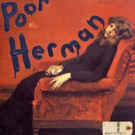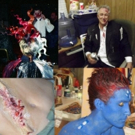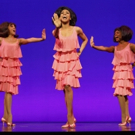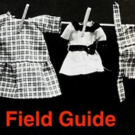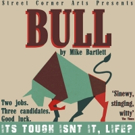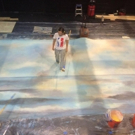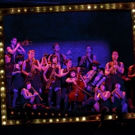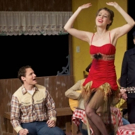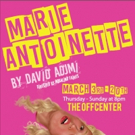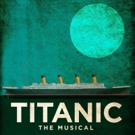Frank Benge - Page 10

A Kansas native, Frank Benge has been involved in the Austin area theatre scene as a Director, Designer, Writer and Performer for the past 20 years. He holds a double BA in Theatre and English from Washburn University.
May 18, 2016
In his lifetime, Herman Melville was considered a failure. Melville was a novelist, short story writer, and poet of the American Renaissance period. His work was almost forgotten during the last thirty years of his life. Today, he is best known for his whaling novel Moby-Dick. His first book, Typee, a romanticized tale of life among Polynesians, was a best-seller that was followed by the sequel, Omoo. His novel Pierre: or, The Ambiguities was a failure, reviled by critics and to this day considered basically unreadable. Melville's career never recovered from it. It is the period after Moby-Dick that forms the basis of POOR HERMAN, a new play by Elisabeth Doss, the great-great-great-granddaughter of Herman Melville.
May 9, 2016
Anytime you see a tour of a Broadway show, the talent happening right before your eyes is just the tip of the Broadway iceberg. Lurking behind the scenes is a whole crew of insanely gifted folks who also contribute to the spectacle on stage. One of those people is Paula Gilbert, who works here in Austin as a dresser for tours that come to Austin. They are called quick changes for a reason. At most touring shows, there's a crew of dressers running around backstage with a needle and thread in their pockets for last-minute repairs and safety pins clipped to their sleeves. There are ensemble dressers, who attend to a large group of people, holding up pants while chorus members step into them and swiftly shoving shoes onto feet. Then there are star dressers, who only focus on a leading player. We talked to Paula to find out what she does, why she loves it and how she keeps calm and collected when things go seriously wrong.
May 7, 2016
A make-up artist is an artist whose medium is the human body, applying makeup and prosthetics for theatrical, television and film. One of the busiest in this area is Kaye Brown, who sat down with us to give our readers a backstage look at her incredible art.
April 28, 2016
Stage Manager… it is one of those credits in your theatre program that you take for granted without ever really thinking about just what that title entails. Stage management, at the core, is the organizing and coordinating of a theatrical production. The words organizing and coordinating encompass a wide variety of activities between director, crew, actors and management. In short, Stage Managers coordinate every aspect of a production, ensuring a successful performance. In our continuing series of interviews with Austin Technical Theatre people, we sat down recently with Stage Manager Rachel Dendy to give our readers a look backstage into a world most audiences never see.
April 27, 2016
MOTOWN: THE MUSICAL is a jukebox musical that premiered on Broadway in April 2013, receiving four Tony Award nominations. Based on Berry Gordy's 1994 autobiography To Be Loved: The Music, the Magic, the Memories of Motown, it tells the story of how he founded and ran the Motown record label. It also touches on his relationships with Diana Ross (Allison Semmes), Marvin Gaye (Jarran Muse), and Smokey Robinson (Jesse Nager). Digging deep into the Motown catalog, the show contains over 60 songs. With that many songs one would expect a pretty thin book; however, by wisely placing most of the focus on Gordy (Chester Gregory) and Ross' relationship and the rise and fall of Motown, we are given a compelling portrait of both Gordy and the music industry. MOTOWN: THE MUSICAL is a celebration of the Motown sound… that sound that joined black and white America in ways nothing else has equaled before or since...that magical period in our past when we were invited to go dancing in the street to a brand new beat.
April 18, 2016
FIELD GUIDE, a work-in-progress by Rude Mechs, is currently in a second draft performance at the Off Center. Rude Mechs creates new works collaboratively, and with FIELD GUIDE they are actively engaging their audience to get feed back on what works and what doesn't in order to help shape the piece. FIELD GUIDE, commissioned by the Yale Repertory Theatre, is a mash-up of Dostoyevsky's The Brothers Karamazov, stand-up comedy, dance and some frankly uncomfortable direct audience addressing confessions. How much of the direct confessions are fact or fiction we'll never really know. What we do know is this is an excitingly different evening of pure theatricality… an evening that you, as an audience member, are being asked to help define. Along the way during your 90 minute journey the Mechs cover topics from the longest Russian novel written such as intellectualism, spiritualism, sensuality and hedonism. While it is ostensibly an adaptation of The Brothers Karamazov, it really just uses the characters in the briefest Cliff Notes sense. This approach allows the performers to riff on the underlying themes present. There is even an unaccredited moment by Tom Lehrer when Robert S. Fisher performs 'They're Rioting in Africa'. What you are treated to is highly experimental in nature and at moments what ensues is truly magical.
April 14, 2016
ANN, written and performed by Emmy® Award winning actress Holland Taylor, is a one woman portrait of Ann Richards, the legendary governor of Texas. Richards' persona was as big as the state itself and just as colorful. Originating at the Galveston Grand Opera, the show has played to sold-out audiences across Texas, winning critical acclaim in Chicago, at the Kennedy Center in Washington, DC, and on Broadway at Lincoln Center's Vivian Beaumont Theater where she won the Outer Critic's Circle Award for Best Solo Performance. ANN has returned to ZACH Theatre in a production directed by Benjamin Endsley Klein. The evening starts out as a commencement address and through flashback covers Richards youth through to her post Governor years. What is revealed is an in depth portrait of this amazing woman who was fighting for the same things that still ring true in our current political arenas. What is also revealed is just how much we need a woman like Ann Richards today and how sorely she is missed.
April 10, 2016
SHE LOVES ME is a musical with a book by Joe Masteroff, lyrics by Sheldon Harnick, and music by Jerry Bock. It is an adaptation of the play Parfumerie by Hungarian playwright Miklos Laszlo. Other adaptations include the films The Shop Around the Corner, In the Good Old Summertime and You've Got Mail. It opened on Broadway in 1963, and has had productions in the West End as well as award-winning revivals and regional productions. It is currently playing in revival on Broadway in a production by The Roundabout Theatre.
April 10, 2016
I first discovered Mike Bartlett when I saw Cock last season. I have been eagerly waiting for more from him because of his wit and his skill at writing dialogue. He has come from relative obscurity 10 years ago to now being a force at the BBC and at England's National Theatre; but at first exposure you know this is a writer whose work is worth seeing. Bartlett is a master at writing realistic dialogue in that black comedy style that is both extremely uncomfortable and hilarious simultaneously. In a way, this work harkens back to The Theatre of Cruelty. The Theatre of Cruelty is a form of theatre developed by avant-garde playwright Antonin Artaud, in The Theatre and its Double. When Artaud spoke of cruelty it was not in the sense of violent behavior, but rather the cruelty it takes for actors to show an audience a truth that they do not wish to see. BULL is very much like that in that when you leave the theater you can expect to question your reasons for laughing… and trust me, you will laugh.
April 7, 2016
One of the more clearly visible technical aspects of a show for average theatre-goers is the set. What isn't quite as clear is just what goes into the creation of the world the characters inhabit in the play you are seeing. Set design, sometimes called scenic design, is the art of designing and creating the sets used in plays or movies. At times, designing can be as simple as arranging a few pieces of furniture on a stage. That type of set design is not what one things of, however, when one talks to set designer, Lisa Laratta, the subject of this edition of Tech Talk.
April 5, 2016
We continue our series on technical theatre artists in Austin with a look at the Art of Costuming. The dictionary defines costuming as "the act of furnishing or designing costumes" but that definition doesn't really tell someone exactly what all goes into that act. A costumer is the person who, for any particular production makes, sells, or rents the costumes that you see for every stage production you attend, whether it is modern dress or elaborate period outfits. It is their work that tells the audience exactly what time period a play is set in more than any other technical theatre element. We sat down with Award Winning Costumer Veronica Prior to find out a little about her and what all is involved in the art of costuming.
March 30, 2016
Based on Christopher Isherwood's novella Goodbye to Berlin (1939) and the subsequent 1951 play by John Van Druten entitled I Am a Camera, CABARET is a musical by John Kander and Fred Ebb with a book by Joe Masteroff that opened on Broadway in 1966. The production was a hit that was subsequently made into the 1972 film by Bob Fosse. In 1993, Sam Mendes re-imagined the material for a new production in London's West End. Mendes' conception was very different from any previous revival. This production was the basis for Roundabout Theatre Company's 1998 and subsequent 2014 revivals, the latter of which is the version currently on tour and being presented at Bass Concert Hall by Lexus Broadway In Austin.
March 28, 2016
Coming from Kansas and receiving my education there, I have more than a passing familiarity with playwright William Inge. Being born in the small town of Independence, Inge attributed his understanding of human behavior to growing up in a small town environment. The influence of that Kansas childhood is evident in many of his works, which tend to revolve around characters that are clearly the products of places like Independence. I remember the head of my college theatre department dismissing Inge's plays as "domestic dramas", which I thought was an unfair assessment both then and now. While Inge may not have the poetic lyricism of a Tennessee Williams or the overarching high moral message of an Arthur Miller; he did have an understanding of the concerns of average Middle Americans. It was because of this understanding that Inge became labeled the 'Playwright of the Midwest'.
March 25, 2016
Very few audience members know what goes into the technical aspects of a stage production. Without the theatre's technical artists, often the unsung stars of any production, your experience at the theatre would be very different. In a new series of articles about the Technical Theatre artists of Austin, BroadwayWorld will be introducing you to some of the artists behind the scenes… the set designers, lighting designers and costumers whose work is so vital to a successful production. The process of lighting a play, dance piece, or opera is highly subjective; each designer has to develop a process that works for them. Lighting designers know how to use the subtle and powerful medium of light, creating effects that can be changed at will to match the mood of the action. We start our series by talking to lighting designer, Amy Lewis.
March 24, 2016
We continue our look at Austin theatre companies and producers with Andy Berkovsky and The City Theatre Company. In their ten year history, they have been recognized by the Austin Critics Table Awards, the B. Iden Payne Awards, the Central Texas Excellence in Theatre Awards, Central Texas Live Theatre, and twice have been named 'Best Theatre Company' by Austin American-Statesman's Austin 360. Most recently, Artistic Director Berkovsky was honored as 2015 Best Director by the Central Texas Excellence in Live Theatre Awards. The company is a nonprofit arts organization and is sponsored in part by the Austin Creative Alliance and the Austin Cultural Arts Division. We sat down with Andy to get a little more information about him and The City Theatre as they celebrate their 10th anniversary at the current location.
March 21, 2016
4000 MILES is a dramedy by Amy Herzog. It ran Off-Broadway 2011 - 2012, was a finalist for the 2013 Pulitzer Prize for Drama and won the 2012 Obie for Best New American Play. The play is a affectionate look at dealing with loss, aging and love told through the relationship of a lost young man making a cross country bike trip and his 91 year old grandmother. What makes 4000 MILES interesting is the subtly incisive dialogue and the fascinating lead characters Herzog has written.
March 14, 2016
Everyone knows what happened to Marie Antoinette… Spoiler Alert: It's not pretty. It also makes intriguing theatre in David Adjmi's MARIE ANTOINETTE, which presents the doomed French queen filtered through the lens of the spoiled entitled rich girl, much like a Nicole Ritchie or a Paris Hilton. His Marie speaks in modern slang… and is pretty foul mouthed as well. Adjmi tells the story of Marie's fall year by year, concluding with her execution. While the script is remarkably faithful to the facts, it takes wild liberties with everything else.
March 14, 2016
THE REALISTIC JONESES is a play by Will Eno. It opened on Broadway in 2014 after premiering in 2012 at the Yale Repertory Theater. Eno has said that he wrote the play because he 'wanted to really just write a naturalistic and realistic play." What he has created plays more like deeply melancholy sitcom. While there are lots of laughs to be found in this 90 minute slice-of-life, they come from a surreal sense of awkwardness that allows the audience to connect to the intense loneliness that permeates these four people's lives.
March 9, 2016
TITANIC is a musical with music and lyrics by Maury Yeston and a book by Peter Stone that opened on Broadway in 1997. It won five Tony Awards including the award for Best Musical. Set on the ocean liner RMS Titanic which sank on its maiden voyage on April 15, 1912; TITANIC has improved with age. The music is simultaneously complex and accessible with lyrics that draw characters, offer thought provoking debate and fills in details with skill and depth. In the impressive production staged by Joshua Denning at McCallum Fine Arts Academy, it reveals itself to be a show of great musical complexity as well as being a show capable of stirring the heart and mind simultaneously, a welcome antidote to all the overblown mega-musicals of today.
March 9, 2016
We continue our series on Austin theatres and producers with David Blackburn and the award winning Austin Theatre Project. In just four short years, Austin Theatre Project has become a company known for new and edgy musical productions. We sat down with him to learn a little more about both him and Austin Theatre Project.
« prev 1 … 7 8 9 10 11 12 13 14 next »
Videos


